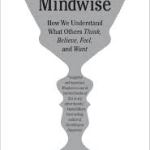 We are overly confident about our capacity to read other people, even our spouses. Trying to “detect the emotion someone is feeling by looking at a picture of their face or looking into someone’s eyes” (two common mind reading tests) actually worsens our accuracy, according to MindWise author and behavioral science professor at the University of Chicago, Nicholas Epley.
We are overly confident about our capacity to read other people, even our spouses. Trying to “detect the emotion someone is feeling by looking at a picture of their face or looking into someone’s eyes” (two common mind reading tests) actually worsens our accuracy, according to MindWise author and behavioral science professor at the University of Chicago, Nicholas Epley.
This flies in the face of common wisdom that, to boost understanding, we should, metaphorically step into the other person’s shoes. As Dale Carnegie famously suggested as his Principle 8 in How to Win Friends and Influence People, “Try honestly to see things from the other person’s point of view.” Yet Epley found that such “overthinking” actually leads to more errors. Even, “the scientific credibility of claims” about microexpressions, the “tells” in the face that last a fifth of a second, “is currently weak, at best,” according to Epley. We are better liars than we think we are.
“Assumptions are the termites of relationships,” Henry Winkler.
Ask. Don’t Speculate.
The key to understanding others better is rare yet blindingly simple. It’s simply to ask, not assume, listen closely to the answer and confirm that you heard it right by telling them what you heard. Epley suggests three ways to do so:
- Talking Stick: Only the person with the stick speaks, then that person could hand it to another or someone could ask for it, yet first had to summarize what they just heard, to the first speaker’s satisfaction, before they continue the conversation.
- Parroting: Simply “parrot” back exactly what you heard before proceeding.
- Speaker-Listener: originally designed by psychologist, Howard Markman for couples to resolve conflicts, yet could work in any disagreements, one person tosses a coin to determine who speaks first. Each person describes exactly what they heard before responding.
A group of retired military officers assumed they knew how soldiers would feel and thus strongly opposed the repeal of “don’t ask, don’t tell” policy. Yet when the Pentagon asked soldier directly, rather than attempting to “mind read” their views, “70 percent believed the repeal would have no effect or a positive effect on the military” according to Epley. Similarly Epley found that top management in companies tends to put more credence in outside consultants’ recommendations than on what employees actually want.
Tip: “The less we know the more we project onto others.”
Who’s Most Preoccupied by Sex Really?
Epley covers other area where we mistakenly focus on our differences and make wrong assumptions. For example, the most important gender difference is… (see the rest of my column at Forbes.)


